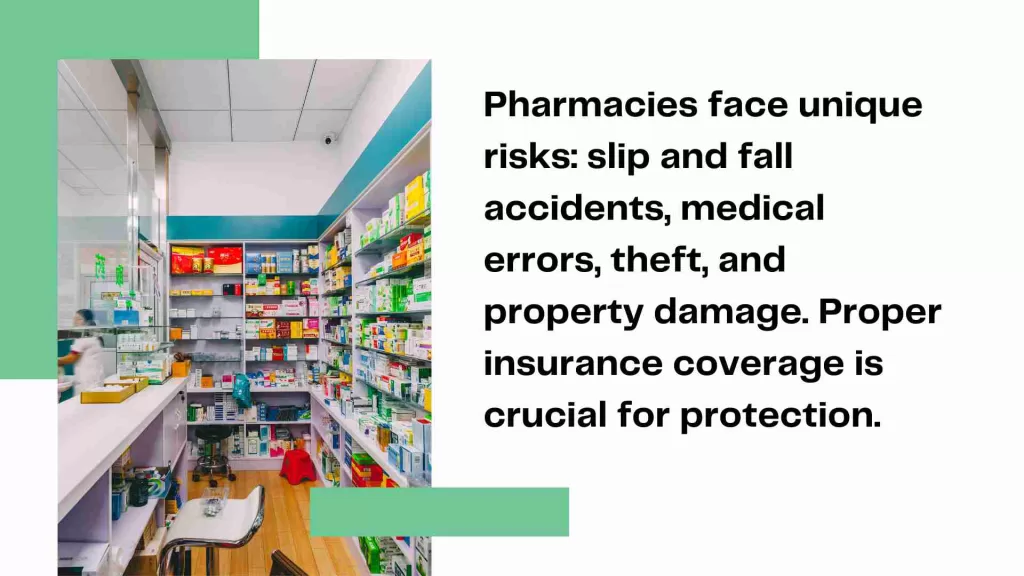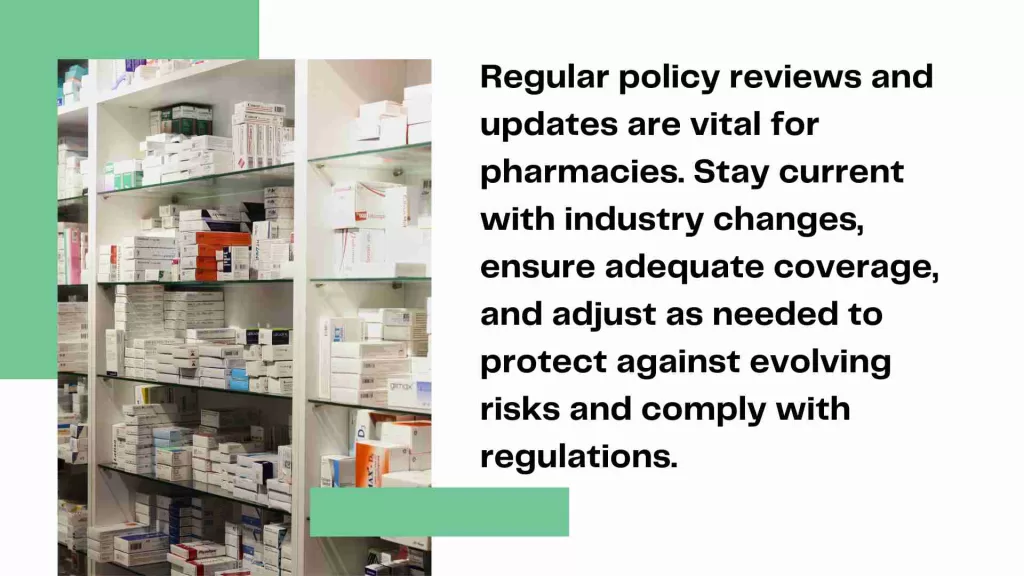Introduction
As we approach 2024, pharmacy owners and operators must prioritize safeguarding their businesses from potential risks and liabilities. Pharmacy Business Insurance is vital to this protection strategy, providing financial security and peace of mind in an ever-changing industry landscape.
This blog post delves into the importance of having comprehensive insurance coverage tailored to your drug store’s unique needs, types of coverage options available, factors affecting premiums, and tips for finding the right policy.
Key Takeaways
- Pharmacy business insurance protects your drug store against potential risks and liabilities in 2024.
- Comprehensive insurance coverage options include general liability, property, workers’ compensation, business interruption, cyber liability, drugs and medicines, and specialty drug coverage.
- Investing in adequate pharmacy business insurance provides financial protection to cover unforeseen expenses and reduce the burden of out-of-pocket payouts. It also helps protect your reputation while ensuring you comply with legal requirements.
- Working with experienced brokers who understand the unique risks facing healthcare providers can help find tailored solutions designed specifically according to industry standards.
Table of Contents
Why Pharmacy Business Insurance Is Crucial For Your Drug Store

Pharmacy business insurance is crucial for your drug store as it provides financial protection, covers liability expenses, and protects against unexpected events.
Provides Financial Protection
One of the most significant advantages of pharmacy business insurance is the financial protection it offers to your drugstore. Operating a pharmacy comes with various risks that can lead to incurring substantial costs, which can be crippling for any small business owner.
For example, imagine a scenario where one of your employees mishandles a prescription and causes harm to a customer. This could result in hefty medical bills, legal fees, and potential compensation payments if the claimant decides to file a lawsuit against your pharmacy.
With adequate liability coverage in place, you can rest assured knowing that your policy will cover these costs up to its limits while allowing you to continue focusing on running your day-to-day operations without added stress or worry.
Covers Liability Expenses
Pharmacy business insurance is vital in covering liability expenses, shielding your drug store from potential financial losses due to claims or lawsuits.
For instance, suppose a customer slips and falls on a wet floor at your pharmacy. Suppose the injured individual decides to sue for medical expenses and lost wages. In that case, general liability coverage will help protect your drug store’s assets by paying for legal costs such as attorney fees and court settlements.
Similarly, suppose an adverse reaction occurs due to incorrect medication dosage dispensed by one of your pharmacists, leading to patient harm or even death. In that case, professional malpractice insurance helps cover the costly litigation process that may follow.
Protects Against Unexpected Events
In the ever-changing world of pharmacy businesses, unexpected events are bound to happen. Pharmacy business insurance provides a safety net for your drugstore during unforeseen circumstances.
Comprehensive insurance can help mitigate the impact of these unexpected incidents on your business operations. It can cover costs associated with property damage or loss related to natural disasters, vandalism, thefts, and cyberattacks that could compromise sensitive customer data.
Furthermore, it may also extend to protection against liability claims arising from accidents or injuries sustained at your premises due to negligence.
Types Of Pharmacy Business Insurance Coverage

Pharmacy business insurance coverage includes general liability, property, workers’ compensation, business interruption, cyber liability, drugs and medicines, and specialty drug coverage.
General Liability Insurance
General Liability Insurance is critical coverage for pharmacies and drug stores. This type of policy can protect your business from potential claims for bodily injury or property damage that may occur on your premises.
For example, if a customer slips and falls in your store or an employee accidentally damages someone’s vehicle while making deliveries, general liability insurance would cover the costs associated with those incidents.
In addition, this coverage can also help with legal fees and settlements if someone sues your pharmacy over issues like false advertising or defamation.
Property Insurance
Property insurance is an important coverage option for pharmacies and drug stores. It protects your business property, including buildings, equipment, inventory, and improvements, from covered accidental physical losses such as damage caused by fire or theft.
As a pharmacy owner or operator, you’ve invested time and money into your business’s physical assets.
For example, if a fire broke out in your building and destroyed all of your inventory and equipment inside the store without property insurance, recovering those costs on your own would be challenging.
Property insurance provides financial protection so you can get back to running your business as quickly as possible after an unforeseen event occurs.
Workers’ Compensation Insurance
Workers’ Compensation Insurance is a crucial coverage that every pharmacy business needs. This type of insurance benefits employees injured or ill due to work-related activities.
It helps cover medical expenses, lost wages, and can even provide disability benefits for employees unable to return to work due to injuries.
For example, if one of your pharmacists slips and falls while stocking shelves, workers’ compensation insurance would help cover their medical expenses and lost income while they recover.
Without this coverage, you could be responsible for paying those costs out of pocket, jeopardizing your business financially.
Business Interruption Insurance
Business Interruption Insurance is an essential coverage option for pharmacy businesses that might experience a temporary shutdown due to unforeseen circumstances such as natural disasters, fire, or other causes beyond their control.
This type of insurance provides financial protection by covering lost income and operational expenses when your business cannot operate.
One example of how Business Interruption Insurance works is when a fire breaks out in your pharmacy store, causing damage that requires repairs before resuming operations.
The revenue loss from being unable to sell prescriptions and related products could be substantial.
In conclusion, Business Interruption Insurance can provide pharmacies with peace of mind by protecting them against unexpected events that might disrupt their daily operations.
Cyber Liability Insurance
Cyber liability insurance is an important type of coverage for any pharmacy that uses digital systems to conduct business. This insurance protects against financial losses from data breaches, cyber-attacks, and other online risks.
For example, if a hacker gains access to sensitive patient information stored on a pharmacy’s computer systems and causes harm by using that data fraudulently or otherwise inappropriately–cyber liability insurance could help cover the cost associated with damages resulting from those actions.
Drugs And Medicines Coverage
Pharmacy business insurance should always include coverage for drugs and medicines. This coverage provides financial protection if your pharmacy’s inventory is damaged, lost, or stolen.
It will help to cover the cost of replacing any prescription medication or other drugs you stock. In today’s market, where drug prices are rising, ensuring that your expensive inventory is properly covered with specific insurance policies, such as inland marine insurance, can protect your bottom line.
For example, if there was a fire at your pharmacy and all your medicine became unusable due to smoke damage, having this type of coverage would provide reimbursement for these items so that you can replace them quickly without incurring significant out-of-pocket expenses.
Specialty Drug Coverage
Specialty drugs are high-cost medications that require special handling and administration. Specialty drug coverage is a type of insurance policy that covers the cost of these expensive prescription medications.
This type of coverage can be particularly important for pharmacies specializing in dispensing specialty drugs, as they may face significant financial losses if their inventory is damaged or destroyed.
For example, if a pharmacy’s refrigerator fails and its stock of specialty drugs is ruined, specialty drug coverage can help cover the cost of replacing the lost medication.
Factors Affecting Pharmacy Business Insurance Premiums

Various factors can affect the premiums of pharmacy business insurance, including the size and type of business, coverage limits, deductibles, risk assessment, claims history, and location.
Business Size And Type
Pharmacy business insurance premiums are highly dependent on the size and type of your pharmacy. Larger pharmacies with more employees and a higher volume of prescriptions pose increased risks, resulting in higher insurance costs.
The specific services offered by your pharmacy also impact coverage needs; for example, a compounding pharmacy may require additional liability coverage due to the unique nature of its products.
Your location can also affect insurance rates, as areas with higher crime rates or natural disaster risk typically result in higher premiums.
Coverage Limits And Deductibles
Coverage limits and deductibles are important when choosing pharmacy business insurance.
It’s essential for pharmacy owners and operators to carefully evaluate their needs and risks when selecting coverage limits and deductibles. A higher coverage limit may provide greater protection but can result in higher premiums.
Similarly, opting for a lower deductible can help reduce out-of-pocket costs but could increase premiums over time.
Risk Assessment
As a pharmacy owner or operator, it’s important to understand your business’s potential risks and take steps to protect yourself. Conducting a risk assessment can help you identify areas of vulnerability and ensure that you have appropriate insurance coverage.
For example, smaller pharmacies with limited staff may be at higher risk for employee-related incidents such as work-related injuries or allegations of harassment.
Meanwhile, larger pharmacies may face greater exposure to customer liability claims due to higher foot traffic.
Claims History
Your pharmacy’s past claims history is pivotal in determining your insurance premiums. Insurance companies review claims data to assess the risk of insuring you and your business against future losses.
Being proactive about safety and preventing accidents can help keep your claim history favorable.
Amtrust Health Insurance offers coverage options for pharmacists, including the importance of having a great “claims- record.”
Location
The location of your pharmacy business can have a significant impact on your insurance premiums. For example, you may pay higher property and liability insurance premiums if you are situated in an area with a high crime rate.
Similarly, if you operate in an area prone to natural disasters such as floods or earthquakes, you may need additional coverage to protect against these risks.
It’s important to research the factors that could impact your insurance rates based on your business’s location before making policy decisions.
Risks Unique To Pharmacies

Pharmacies face unique risks such as slip and fall accidents, medical errors and malpractice, theft and burglary, and damage to property or equipment.
Slip And Fall Accidents
Pharmacies face unique risks that require comprehensive insurance coverage. One of the most common accidents in pharmacies is slip and fall incidents, which can result in costly lawsuits and liability claims.
Slippery floors, uneven surfaces, or misplaced items on the floor can easily cause a customer to trip and suffer an injury.
For instance, if a customer slips and falls while picking up their prescription at your pharmacy, you could be liable for their medical expenses or lost wages if they have to take time off work due to their injuries.
This accident can result in expensive legal fees without proper insurance coverage.
Medical Errors And Malpractice
Pharmacies must be especially vigilant regarding medical errors and malpractice, as these can have serious consequences for patients and the business.
Sometimes, a pharmacy may dispense the wrong medication or dosage, which could lead to adverse effects or even death.
Pharmacies can protect themselves against medical errors and malpractice with comprehensive liability insurance coverage. This policy can cover expenses related to lawsuits filed by patients who experience harm due to medication errors or other pharmacy-related issues.
Theft And Burglary
Pharmacies are at risk of theft and burglary due to the valuable drugs and medications that they store. Pharmacy burglaries have been on the rise in recent years.
This makes it crucial for pharmacy owners to have proper insurance coverage in case thieves target their business. Theft can result in inventory loss, property or equipment damage, and interrupted business operations.
With drugstore business insurance, you can protect your company from the financial consequences of these events and ensure that your customers continue to receive uninterrupted service.
Damage To Property Or Equipment
One potential risk for any pharmacy business is damage to property or equipment. Accidents can happen, and unexpected events like fires, floods, and storms can cause significant damage to a drugstore’s physical assets.
This could include building and fixtures, furniture, machinery, and inventory damage.
Fortunately, commercial property insurance is a type of coverage that can protect against these risks. It covers your drug store’s physical assets if they are damaged by covered perils such as fire or theft.
Finding The Right Pharmacy Business Insurance

To ensure adequate coverage to protect your pharmacy business, working with an experienced insurance broker, comparing multiple quotes and policies, understanding policy coverage and limitations, and considering bundling insurance options are essential.
Work With An Experienced Insurance Broker
One of the most important steps in finding the right insurance for your pharmacy business is to work with an experienced insurance broker. These professionals can help you navigate the complex world of insurance policies and coverage options, ensuring you find a plan that meets your needs and budget.
For example, Hartford offers specialized insurance for pharmaceutical companies, providing comprehensive coverage for drug stores, pharmacies, apothecaries, and proprietary stores.
Online Insurance Quotes is another resource that allows easy access to a comprehensive small business insurance policy tailored specifically for pharmacies and drug stores.
Compare Multiple Quotes And Policies
As a pharmacy owner or operator, finding the right insurance coverage that fits your unique needs and risks is crucial. One way to do this is by comparing quotes and policies from different insurance providers. Here are some tips on how to compare:
- Identify your specific insurance needs and risks.
- Research and make a list of potential insurance companies.
- Request quotes from each company for the same level of coverage.
- Compare the quotes side-by-side, looking at coverage limits, deductibles, and premiums.
- Consider other factors, such as customer service ratings and policy exclusions.
- Ask questions and clarify any confusion with the insurance provider before making a final decision.
Remember that the cheapest option may not always be the best choice, as it may not provide adequate coverage for your business. Choosing a reputable insurer that offers comprehensive protection tailored to your pharmacy’s unique needs is important.
Understand Policy Coverage And Limitations
It is important to understand pharmacy business insurance’s policy coverage and limitations. Before purchasing a policy, pharmacy owners should carefully review what is covered and what isn’t.
For example, some insurance policies may not cover damages caused by natural disasters or acts of God, such as earthquakes or floods. Others may not cover intentional or criminal acts committed by employees.
It’s important for pharmacy owners to fully understand their policy’s coverage and exclusions so they can make informed decisions about protecting their business.
Pharmacy businesses face unique risks that require specialized forms of protection through carefully tailored packages from reputable insurers like The Hartford, Amtrust Health Insurance, amongst others, which offer additional coverage options for pharmacists; understanding which types of coverage are required by law (state-specific) including licensing and certification requirements will also be beneficial when making choices on policies.
Consider Bundling Insurance Options
Bundling insurance policies can be a great option for pharmacy owners looking to save on costs. This involves combining multiple types of insurance, such as general liability and property insurance, into one package with a single premium payment.
Bundling can save money and simplify the process of managing different insurance policies. For example, suppose a pharmacy has both property damage and liability coverage bundled together. In that case, they won’t have to worry about separate claims processes in the event of an incident that impacts both areas.
Amtrust Health Insurance is just one provider that offers bundled options specifically designed for pharmacies. Their PharmacyGuard program includes various coverages like business interruption protection, cyber liability coverage, workers’ compensation insurance, and more – all bundled together in one convenient policy package.
Common Exclusions In Pharmacy Business Insurance

Insurance policies for pharmacies may not cover deliberate or criminal acts, natural disasters or Acts of God, failure to comply with regulations and protocols, and employee misconduct.
Deliberate Or Criminal Acts
Pharmacy business owners must understand that their insurance policy may not cover deliberate or criminal acts committed by them, their employees, or others.
This means that if someone intentionally causes harm or damage to your business, you may not be protected under your general liability insurance policy. For example, if an employee deliberately tampers with medication and a patient is harmed, you may face legal action from the patient. You will need specialized coverage, such as malpractice insurance.
It’s important to note that criminal acts like theft are also typically excluded from standard policies and require additional coverage options.
Natural Disasters Or Acts Of God
In the event of a natural disaster or ‘act of God’, such as an earthquake, flood, or hurricane, a pharmacy business insurance policy can rescue you.
However, it’s important to note that standard policies may not cover all-natural disasters, and you may need additional coverage depending on where your business is located.
For instance, consider adding specific coverage for those events if you’re in an area prone to floods or earthquakes.
According to industry experts at The Hartford and Online Insurance Quotes, protecting your pharmacy from the unknowns presented by Mother Nature is just one aspect of having comprehensive pharmacy insurance.
Considering factors like property damage due to weather conditions can be daunting. Still, having-in-place general liability insurance can be helpful since it protects against unexpected events such as hurricanes and floods, which could happen in any region within the United States.
Failure To Follow Proper Regulations And Protocols
Pharmacy business owners must adhere to strict regulations and protocols when operating their stores. Failure to do so can result in serious consequences, including legal action and the loss of license.
For example, if a pharmacy fails to store medications according to regulatory standards properly, it could lead to contamination or medication damage, putting patients at risk.
Maintaining compliance with regulations and protocols is critical for every pharmacy owner. However, it’s also important to have adequate insurance coverage that protects against liability resulting from any unintentional mistakes or oversights.
Employee Misconduct
It’s an unfortunate reality that employee misconduct can occur in any business, including pharmacies. Misconduct can range from minor offenses like arriving late for work to more serious issues such as theft or fraud.
To protect your business from potential liabilities stemming from employee misconduct, it’s important to have proper insurance coverage. This may include employment practices liability insurance, which provides coverage for claims related to wrongful termination, discrimination, harassment, and other similar allegations.
Pharmacy owners should prevent employee misconduct by conducting thorough background checks on new hires and maintaining a positive work environment with clear expectations around proper conduct.
Legal Requirements For Pharmacy Business Insurance
It’s important to know state-specific laws and pharmacy business insurance coverage requirements.
State-Specific Laws And Regulations
It’s important to understand that state-specific laws and regulations significantly determine the insurance requirements for pharmacy businesses.
These laws could vary significantly from state to state, meaning you might need different coverage levels or policies depending on your pharmacy is location.
For example, some states require pharmacists to carry specific types of liability insurance, while others don’t have such requirements.
To ensure compliance with all applicable laws and regulations, you must work with an experienced insurance broker who can guide you through the intricacies of these rules.
Minimum Coverage Requirements
It’s important for pharmacy owners to understand the minimum coverage requirements for their business insurance policy. The specific requirements can vary by state and depend on factors such as the size of your business and the type of services provided.
For example, some states require pharmacies to carry minimum liability insurance or workers’ compensation coverage.
Failing to meet these minimum requirements can result in legal penalties and leave your business vulnerable to financial losses in case of an accident or lawsuit.
It’s always a good idea to work with an experienced insurance broker who can help you navigate these regulations and ensure that you have adequate coverage for your pharmacy operations.
Licensing And Certification
Being aware of your state’s licensing and certification requirements is crucial as a pharmacy owner. Different states have varying pharmacy regulations, so it’s important to research the guidelines specific to your location.
In addition to state requirements, there are federal regulations that pharmacies must abide by, such as those set by the FDA and DEA. Understanding these guidelines can help you avoid legal issues down the line.
Importance Of Regular Policy Reviews And Updates

Regular policy reviews and updates are important to ensure your pharmacy business is adequately covered, especially as the industry and regulations evolve.
Keep Up With Industry Changes And Regulations
Staying up-to-date with industry changes and regulations is crucial for any pharmacy business. The pharmaceutical industry continuously evolves, and new laws and protocols are implemented to improve safety and efficacy.
One example of an industry change that pharmacies should be aware of is the increasing role of Pharmacy Benefit Managers (PBMs) in the healthcare system. PBMs act as intermediaries between insurance providers and pharmacies.
Recent scrutiny has been focused on their practices, highlighting a need for close monitoring by pharmacy owners to ensure they understand how this may affect their operations.
Additionally, knowledge about what prescriptions are covered by health insurance is essential for pharmacists looking to provide optimal customer service while protecting their bottom line.
Ensure Adequate Coverage For Your Business
Regular policy reviews and updates ensure your pharmacy business has adequate insurance coverage. As the industry changes and regulations evolve, keeping up with these developments and adjusting your coverage accordingly is essential.
For example, if a customer falls in your store due to a wet floor and sustains injuries, inadequate liability coverage could result in costly legal fees and damages awarded against your business.
By regularly reviewing your policy limits and coverages, you can ensure sufficient protection against potential risks unique to pharmacies.
Adjust Coverage As Needed
Regularly reviewing and adjusting your pharmacy business insurance coverage is crucial in ensuring adequate protection for your drugstore. As the industry evolves, so do the risks and potential liabilities of running a pharmacy.
For example, adding new services or products to your inventory may require additional coverage to protect against any associated risks.
Staying up-to-date with changes in regulations and laws that affect the pharmaceutical industry can also impact your insurance needs. Regularly reviewing and adjusting your policy coverage based on these factors can protect yourself and your business from potential financial loss due to unexpected events or legal issues.
Conclusion: Protect Your Pharmacy Business With The Right Insurance Coverage In 2023
In today’s unpredictable business landscape, having the right insurance coverage for your pharmacy is crucial. Not only does it provide financial protection against unexpected events and liability expenses, but it also ensures that you’re compliant with legal requirements.
By understanding the risks unique to pharmacies and finding the right policy at a competitive price, you can safeguard your business and protect yourself from potential lawsuits.
FAQs:
Why is pharmacy business insurance important for my drugstore in 2023?
Pharmacy business insurance can help protect your drug store from financial losses from unexpected events such as property damage, liability claims, theft, or inventory loss. Proper insurance coverage can give you peace of mind and allow you to focus on running your business confidently.
What types of coverage should I consider when purchasing pharmacy business insurance?
Basic coverage options include property, general liability, worker’s compensation, and product liability insurance. Additional coverage options may be available depending on the size & nature of our operation. Hence, it’s a good idea to consult with an experienced agent to obtain comprehensive advice about what options best suit your needs.
How much does pharmacy business insurance cost on average?
The cost of pharmacy business insurance can vary based upon several factors such as the location/of operation, size/revenues generated by operations/products sold through outlets (i.e., retail vs. wholesale), number of employees, etc. It’s always best to discuss policies & pricing-specific conditions affecting our risk profile with qualified agents before deciding which type/amounts are right for you.
Are any discounts or promotions available for purchasing Pharmacy Business Insurance in 2023?
Some insurers may offer discounts or promotional deals for new customers who opt into pre-defined policies. These offerings are subject to change, however, so we recommend staying updated by contacting potential providers periodically to inquire about the latest discount information availability! Another option might be engaging brokers who work across multiple providers representing clients’ interests while negotiating better rates directly on their behalf.
Reference Lists
https://www.thehartford.com/business-insurance/pharmacy
https://www.businessinsuranceusa.com/business-insurance-pharmacy
https://www.trustedchoice.com/n/44/pharmacy-insurance/
https://www.galtinsurance.com/pharmacy-insurance
https://content.naic.org/cipr-topics/pharmacy-benefit-managers
https://www.bcbs.com/the-health-of-america/articles/three-things-know-become-pharmacy-pro
- Does M&S Do Car Insurance? A Full Guide In 2024 - April 15, 2024
- Pet Insurance for Older Dogs: 2024 Full Guide & Top Providers - March 17, 2024
- Small Business Equipment Breakdown Insurance: Full Coverage - November 6, 2023

